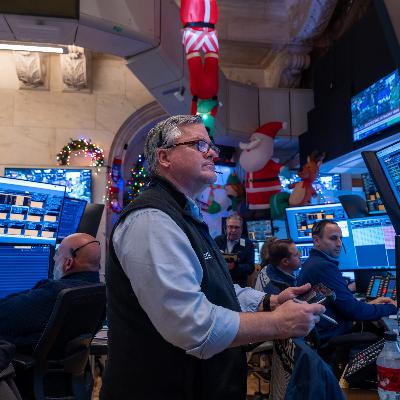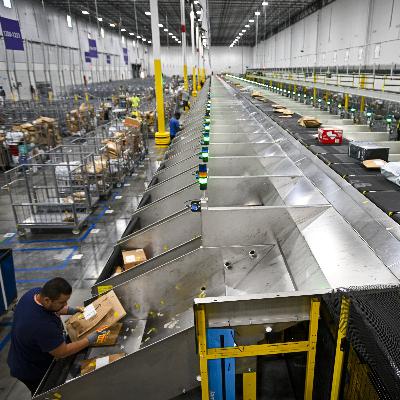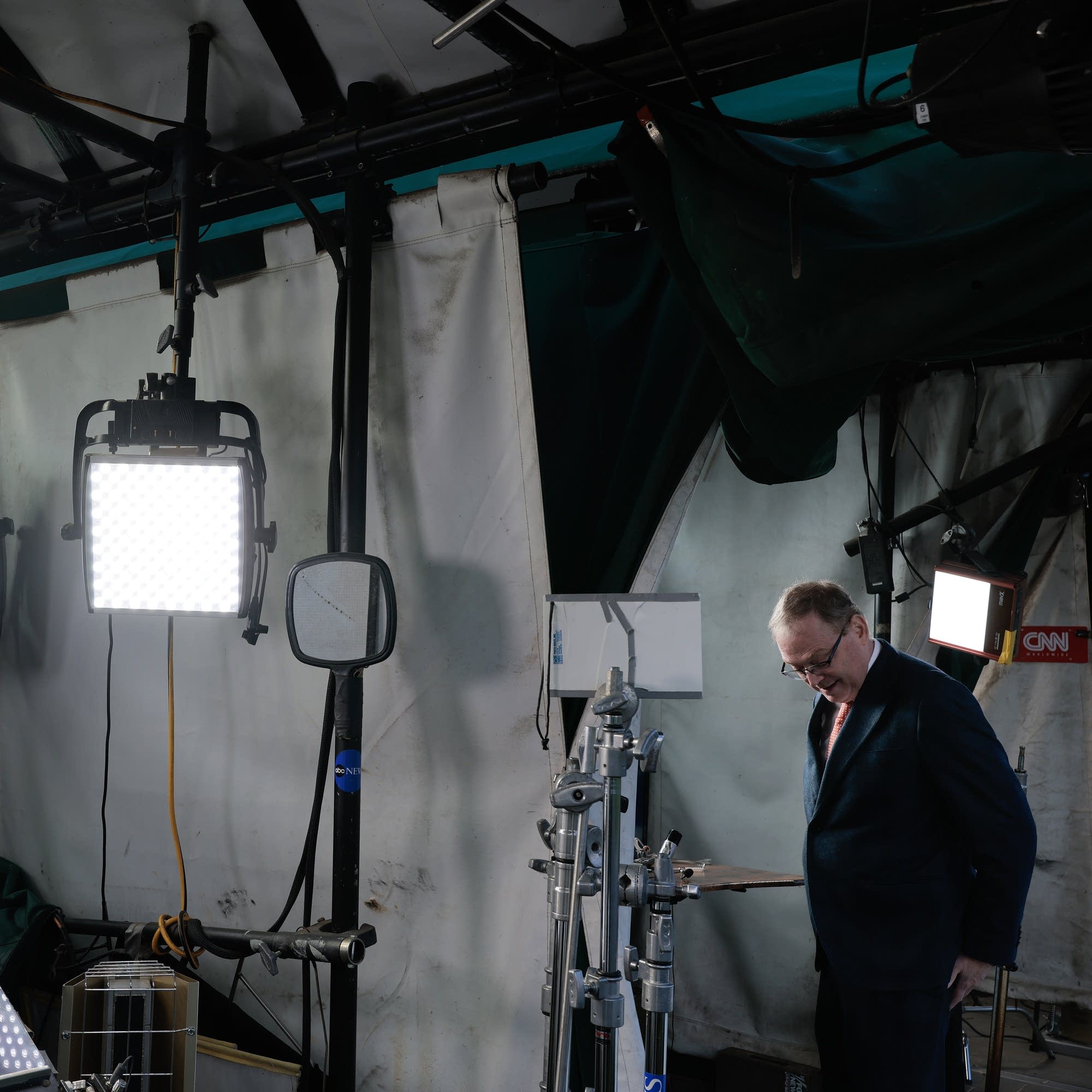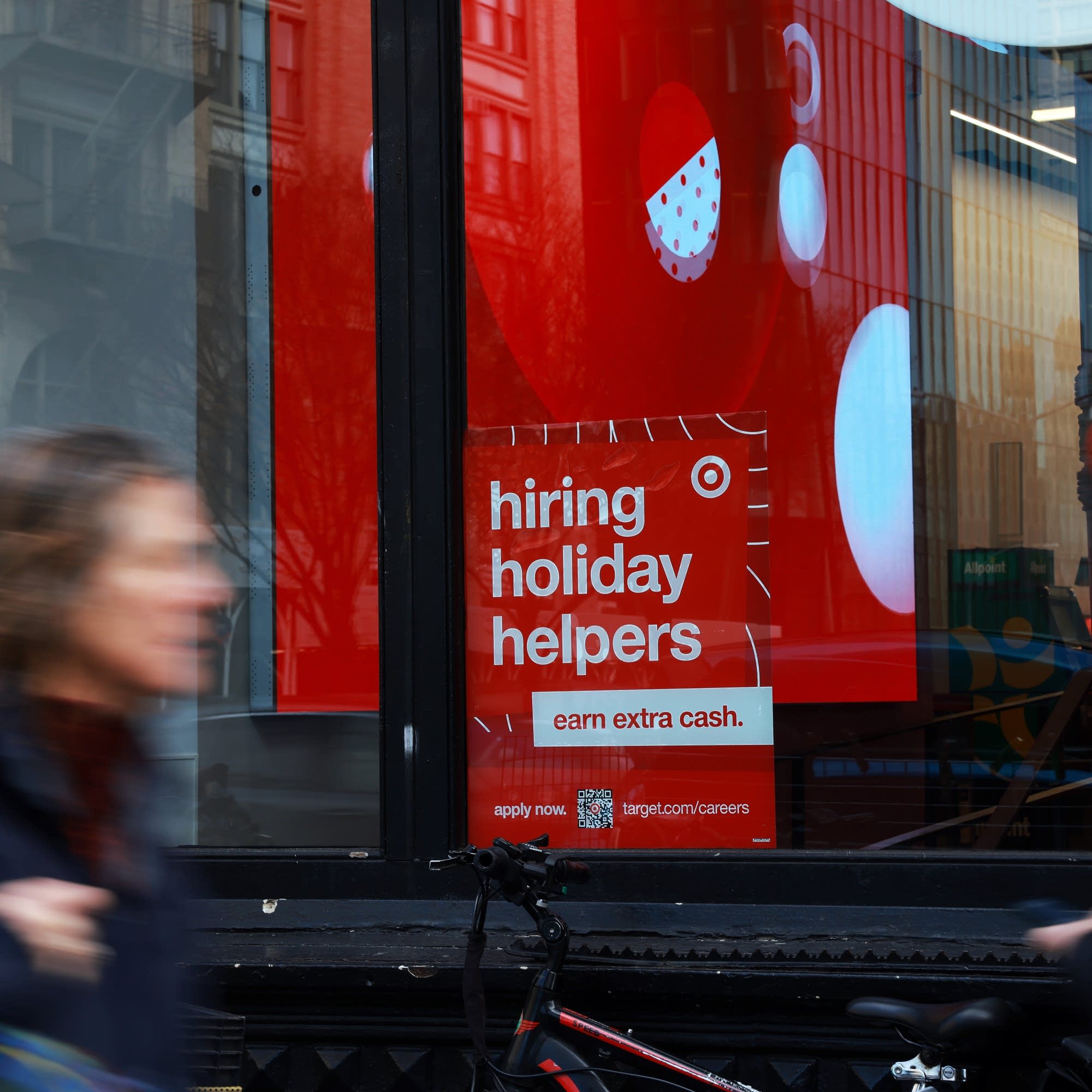Discover Marketplace
Marketplace

Marketplace
Author: Marketplace
Subscribed: 60,523Played: 4,953,290Subscribe
Share
© Copyright 2025 Minnesota Public Radio
Description
Every weekday, host Kai Ryssdal helps you make sense of the day's business and economic news — no econ degree or finance background required. "Marketplace" takes you beyond the numbers, bringing you context. Our team of reporters all over the world speak with CEOs, policymakers and regular people just trying to get by.
240 Episodes
Reverse
The labor market has been tightening all year, and Americans have grown increasingly anxious about their ability to find new jobs. A bit of good news? New unemployment claims fell last week. But that isn’t likely to signal a full job market turnaround in the new year. Plus: AI investment hasn’t slowed under Trump’s tariffs, a TikTok creator shares “recession recipes,” and we learn about the history of Legos.Every story has an economic angle. Want some in your inbox? Subscribe to our daily or weekly newsletter.Marketplace is more than a radio show. Check out our original reporting and financial literacy content at marketplace.org — and consider making an investment in our future.
From July through September, U.S. gross domestic product rose 4.3%, the highest in two years. At a time when many consumers are feeling economic pressure, higher earners and certain businesses are doing very well — and spending to match it. In this episode, can the impressive rate of growth continue? Plus: Affordable Care Act marketplace insurance alternatives fall short, winter surfing boosts Great Lakes tourism revenue, and holiday spending is up, according to credit card companies. Every story has an economic angle. Want some in your inbox? Subscribe to our daily or weekly newsletter.Marketplace is more than a radio show. Check out our original reporting and financial literacy content at marketplace.org — and consider making an investment in our future.
Gold surpassed $4,400-per-ounce for the first time Monday. Prices are up 60% in 2025. In the same year, the value of the U.S. dollar slipped 9%. What gives? In both cases, economic and geopolitical uncertainty play a role. Also in this episode: Ranchers can't simply produce more beef to tamp down rising prices, corporations are on the hunt for “storytellers,” and successful product recalls involve many moving parts.Every story has an economic angle. Want some in your inbox? Subscribe to our daily or weekly newsletter.Marketplace is more than a radio show. Check out our original reporting and financial literacy content at marketplace.org — and consider making an investment in our future.
Consumer sentiment really ran the gamut this year. But right now, Americans are feeling almost as bad about the economy as they were when inflation was at its peak summer of 2022. In this episode, we chronicle 2025’s consumer vibes rollercoaster. Plus: Kansas City’s housing market preps for the 2026 World Cup, a college professor offers an AI-driven macroeconomic theory course, and we go over the week’s headlines.Every story has an economic angle. Want some in your inbox? Subscribe to our daily or weekly newsletter.Marketplace is more than a radio show. Check out our original reporting and financial literacy content at marketplace.org — and consider making an investment in our future.
November inflation data came in lower than expected, according to the latest CPI report. But we can’t compare it to the previous month, since the BLS skipped several October reports. And data collection began late thanks to the shutdown, right in the middle of retailers’ Black Friday sales. In this episode, key caveats to the November CPI. Plus: Experts cautiously predict a more balanced housing market in 2026, tech stocks take a hit as data center debt climbs, and a growing number of politicians reject economists’ expertise.Every story has an economic angle. Want some in your inbox? Subscribe to our daily or weekly newsletter.Marketplace is more than a radio show. Check out our original reporting and financial literacy content at marketplace.org — and consider making an investment in our future.
A U.S. blockade of Venezuelan oil tankers may sound disruptive, but global oil is plentiful, and Gulf Coast refiners remain tied to Venezuela’s heavy crude after decades of investment. If sanctions are lifted and Venezuelan oil flows again, it could benefit refiners and drivers alike. Also in this episode: why bank deposits are growing, how the Gap staged a successful turnaround, and where trade workers are experimenting with AI.Every story has an economic angle. Want some in your inbox? Subscribe to our daily or weekly newsletter.Marketplace is more than a radio show. Check out our original reporting and financial literacy content at marketplace.org — and consider making an investment in our future.
The U.S. unemployment rate climbed to 4.6% in November, according to the latest BLS jobs report. There’s also data showing more Americans are reentering the workforce and more part-time workers are looking for full-time roles. In this episode, we explain what it all means for the broader economy. Plus: Advertising revenue is projected to top $1 trillion in 2025, hiring in the once-strong health care sector may slow soon, and artificial intelligence drives some young people into trade school.Every story has an economic angle. Want some in your inbox? Subscribe to our daily or weekly newsletter.Marketplace is more than a radio show. Check out our original reporting and financial literacy content at marketplace.org — and consider making an investment in our future.
IRS filings for new business applications have been climbing the past few months — particularly in the retail sector. The last time we saw a spike like this was in 2020. Are Americans ditching the corporate life, seeking stability, or in need of a second income? Likely a mix of all three. Also in this episode: Insurance coverage decisions go beyond medication sticker prices, home builder confidence ticks up, and the penny phase-out adds up for businesses doing a lot of cash transactions.Every story has an economic angle. Want some in your inbox? Subscribe to our daily or weekly newsletter.Marketplace is more than a radio show. Check out our original reporting and financial literacy content at marketplace.org — and consider making an investment in our future.
While markets are mellowing a bit, three major stock indexes closed at record highs on Thursday. Reminder: The stock market is not the economy! But it still can tell us how investors — and by association, high-income Americans — are feeling about the future. In this episode, who wins when the stock market performs well. Plus: Old MacDonald has a ... drone? And we check-in with three retailers around the U.S. about the holiday shopping season.Every story has an economic angle. Want some in your inbox? Subscribe to our daily or weekly newsletter.Marketplace is more than a radio show. Check out our original reporting and financial literacy content at marketplace.org — and consider making an investment in our future.
Federal Reserve Chair Jay Powell’s latest presser was all about the job market. Buried among the usual talking points, like hiring sentiment and the unemployment rate, was immigration. That’s because the current administration’s immigration policies are complicating Fed measures of labor market health. In this episode, falling immigration turns jobs data on its head. Plus: Robust economic growth comes without typical job creation, U.S.-China trade tensions cool, and one company teaches AI to sort your trash.Every story has an economic angle. Want some in your inbox? Subscribe to our daily or weekly newsletter.Marketplace is more than a radio show. Check out our original reporting and financial literacy content at marketplace.org — and consider making an investment in our future.
The Federal Reserve cut its key interest rate Wednesday by a quarter point. That’s pretty much what analysts expected. But in other parts of the world, central banks have been signaling that they plan to hold rates steady or even hike them. In this global economy, why is the U.S. out of step? Also in this episode, we hear the pros and cons of quarterly earnings reports, check in on a union-run pipefitting apprenticeship and dig into why wage growth has slowed.Every story has an economic angle. Want some in your inbox? Subscribe to our daily or weekly newsletter.Marketplace is more than a radio show. Check out our original reporting and financial literacy content at marketplace.org — and consider making an investment in our future.
When revenue grows, hiring grows — usually. But in November, retail sector job cuts were up nearly 140% year over year, according to outplacement firm Challenger, Gray & Christmas, in spite of strong consumer spending. What gives? Mostly, more automation. Also in this episode: Medium-term bonds send hints about Fed interest rate decisions, an AI bubble burst will come with new jargon, and small business owner optimism is up.Every story has an economic angle. Want some in your inbox? Subscribe to our daily or weekly newsletter.Marketplace is more than a radio show. Check out our original reporting and financial literacy content at marketplace.org — and consider making an investment in our future.
We now know some details about the Trump administration’s promised agricultural relief package. Central to the plan is billions in one-time payments to U.S. farmers, who have been hurting under new trade policies and rising equipment costs. Is it enough? Also in this episode: What FOMC members are likely contemplating ahead of this week’s meeting, who will be most hurt by rising ACA health insurance premiums, and why home builders overestimated new construction demand in 2025.Every story has an economic angle. Want some in your inbox? Subscribe to our daily or weekly newsletter.Marketplace is more than a radio show. Check out our original reporting and financial literacy content at marketplace.org — and consider making an investment in our future.
Small business owners know affordability is top-of-mind for their customers. But as margins grow narrower, keeping prices as-is isn’t always possible. In this episode, we hear from a few small business owners about how they’re balancing cash-strapped shoppers and rising costs. Plus: The potential Netflix-Warner Bros deal could mean less variety for viewers, Midwestern farmers hope to carve out a market for local oats, and a discussion of the week’s economic headlines.Every story has an economic angle. Want some in your inbox? Subscribe to our daily or weekly newsletter.Marketplace is more than a radio show. Check out our original reporting and financial literacy content at marketplace.org — and consider making an investment in our future.
Changes are afoot at the Federal Reserve: President Donald Trump will name a new Fed chair in the coming year, and the central bank’s job could get complicated as the economy absorbs the full impact of new tariffs. In this episode, why Fed independence is crucial and where the federal funds rate is headed in 2026. Plus: Families weigh the cost of child care, the BLS remains behind on data releases, and state farm bureaus offer cheaper health insurance to farmers — with a catch.Every story has an economic angle. Want some in your inbox? Subscribe to our daily or weekly newsletter.Marketplace is more than a radio show. Check out our original reporting and financial literacy content at marketplace.org — and consider making an investment in our future.
Small business owners’ economic moods remain mixed. But, as is so often the case, how folks feel is different from how they act. And hard data tells us small business owners are pulling back on hiring — one ADP report shows businesses with fewer than 50 employees cut a net 120,000 jobs in November. Should we be worried? Plus: Retailers benefit from buy now, pay later offerings, import prices sans fuel rose in September, and cap-and-trade carbon emissions programs have changed since their inception.Every story has an economic angle. Want some in your inbox? Subscribe to our daily or weekly newsletter.Marketplace is more than a radio show. Check out our original reporting and financial literacy content at marketplace.org — and consider making an investment in our future.
The Federal Reserve’s quantitative approach to monetary policy decisions means its governors tend to reach consensus. But in the past few meetings, some FOMC members have disagreed on whether to prioritize jobs or inflation. In this episode, “Marketplace” host Kai Ryssdal and former FOMC member Daniel Tarullo discuss why the Fed is divided right now. Plus: Dollar stores weather an uncertain economy, companies use return-to-office policies as a workforce reduction mechanism, and electricity demand grows as data centers pop up nationwide.Every story has an economic angle. Want some in your inbox? Subscribe to our daily or weekly newsletter.Marketplace is more than a radio show. Check out our original reporting and financial literacy content at marketplace.org — and consider making an investment in our future.
The Organization of Petroleum Exporting Countries will hold oil production steady next quarter as global supply remains unusually high, driven by record output from the U.S., Brazil, Canada, and Norway. At the same time, demand is low due to a tipsy global economy and rising EV adoption. Also in this episode: What a no-immigration economy may look like, why Zillow removed climate risk information from home listings, and how food companies introduce healthy versions of staple offerings.Every story has an economic angle. Want some in your inbox? Subscribe to our daily or weekly newsletter.Marketplace is more than a radio show. Check out our original reporting and financial literacy content at marketplace.org — and consider making an investment in our future.
Holiday spending tends to drive up U.S. consumers’ credit card debt. In the past, most households were able to pay down that debt come the new year. But as wallets get squeezed, that may not be the case in 2026. Plus: Monopoly celebrates his 90th anniversary, a family moves from a farm to the city, and we visit a lab growing the chocolate of the future.Every story has an economic angle. Want some in your inbox? Subscribe to our daily or weekly newsletter.Marketplace is more than a radio show. Check out our original reporting and financial literacy content at marketplace.org — and consider making an investment in our future.
Retailers don’t seem to be looking for many temp workers this holiday season. But it’s not the only sector that hires winter workers — event venues, transportation and warehousing still have some demand. Also in this Thanksgiving episode: There’s a growing market to manage kids’ screen time, a musician combats AI scraping, and a family explores stock market investing.Every story has an economic angle. Want some in your inbox? Subscribe to our daily or weekly newsletter.Marketplace is more than a radio show. Check out our original reporting and financial literacy content at marketplace.org — and consider making an investment in our future.


























TDS?
TDR?
I guess tugboats were not needed to prevent bridge damage.
All that discussion of Trump's meme coin with no mention of Trump's personal ownership and control of a large quantity of them? No mention of the unlimited opportunity for untraceable bribes and grift? No mention of Trump's documented history of shakedowns for favorable treatment?
I have been using the business consumer reviews site for quite some time now, and I must say, it has been a game-changer for me. The user-friendly interface makes it incredibly easy to navigate and find the information I need. The reviews are detailed and informative, giving me a clear picture of what to expect from a particular business, for more information visit and read https://www.pissedconsumer.com/ . I appreciate the transparency and honesty of the reviews, as it helps me make informed decisions when choosing where to spend my money. Overall, my experience with this site has been nothing short of excellent, and I highly recommend it to anyone looking for reliable and trustworthy business reviews.
2025 could be the year of small AI as advancements in efficiency, scalability, and accessibility make it easier for businesses and individuals to harness AI's potential on a smaller scale. Exciting times ahead!
$100 Registration Bonus Eksklusibo sa jet!
Maging Miyembro ng daddy at Makatanggap ng $100 Agad!
Magsimula sa fresh: Makakuha ng $100 Welcome Bonus!
Magsimula sa fresh: Makakuha ng $100 Welcome Bonus!
sherbet Registration Bonus: Libreng $100 Para sa Mga Bagong User!
Magparehistro sa supernova at Makakuha ng $100 Bonus Kaagad!
Magparehistro sa supernova at Makakuha ng $100 Bonus Kaagad!
Sumali sa jazz Ngayon at Kumuha ng $100 Welcome Bonus!
Sumali sa jazz Ngayon at Kumuha ng $100 Welcome Bonus!
Simulan ang Iyong Paglalaro sa 500 casino na may Libreng $100 Bonus!
$100 Bonus Agad Para sa Mga Bagong User ng highway!
Bagong User? Sumali sa sol at Makatanggap ng $100 Bonus!
Makakuha ng $100 Bonus Kapag Nagparehistro sa exclusive Ngayon!
Climate change. It didn:'t help setting 3 fires to spontaneously grow and take advantage of the Santa Ana winds to bring the housing lots back on the market, and then hint that multiple family housing should replace all of those private homes.Forcing sell-off of obviously damaged property to those that can profit buy rebuilding, and maybe Miami highrise style that corporations own, and not the cozy wannabes that just think of themselves. How dare they. Think huge glass towers. Miami 2.0